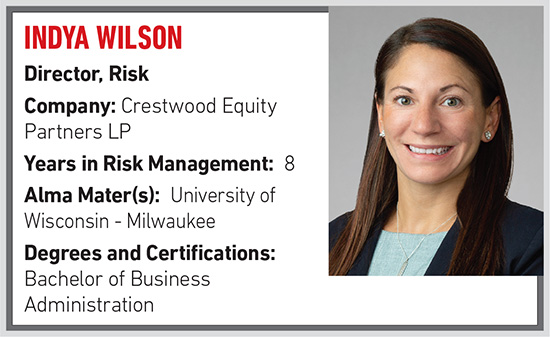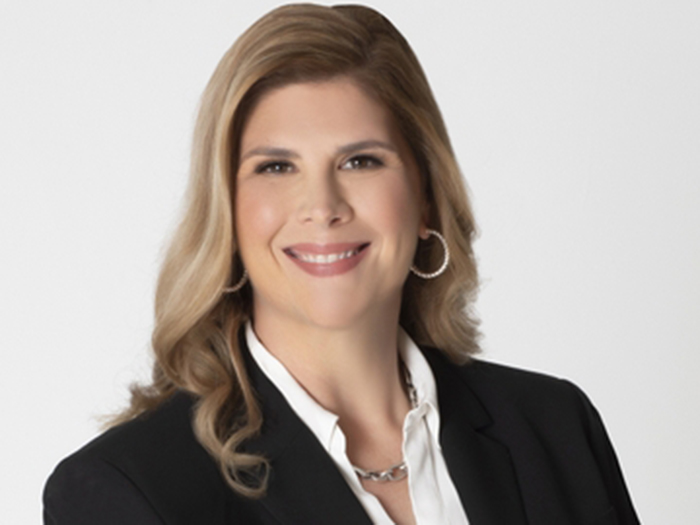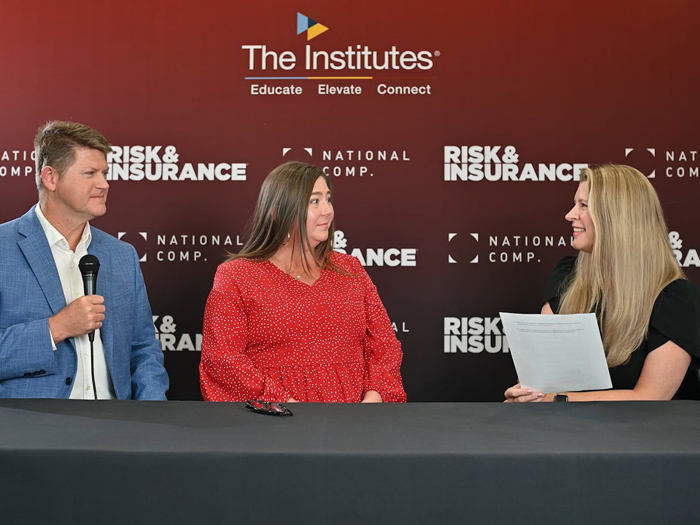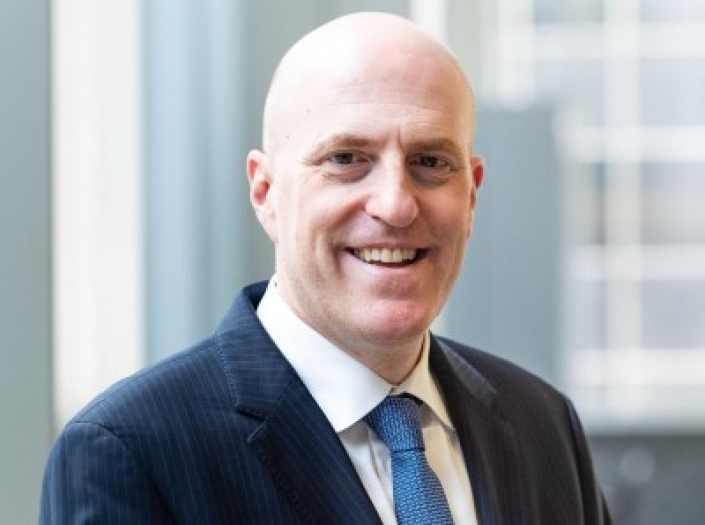Crestwood Equity’s Director of Risk Indya Wilson Shares Her Career Journey, the Importance of Industry Relationships and What’s New in Oil and Gas
 R&I: What was your first job?
R&I: What was your first job?
I had two jobs. One was a paralegal for a law firm in Wisconsin. They practiced various types of law, from criminal, real estate, divorce to tax. I also worked for a minor league indoor soccer team doing marketing, game day operations and promotions.
I had no oil and gas or risk management experience out of college. I also lived in Wisconsin, where energy companies do not have such a presence as they do in Texas. As I tell people all the time, before I moved into this field, the oil and gas industry was literally a gas station to me. I had no idea of the mecca that sits in Texas and around the world.
R&I: How did you come to your current position?
My husband and I moved to Texas about 11 years ago, and I just needed any job. I started with an employment agency. They set me up with a temporary position as an executive assistant at Crestwood. I assumed it would be temporary, and I would do this while I searched for jobs in marketing or finance. Low and behold, 11 years later, I am still here.
R&I: What’s been the biggest change in risk management and the insurance industry since you’ve been in it?
The biggest change I have seen is the focus of risk management. At the time I started, workers’ comp and auto accidents were the primary focus due to the developing nuclear auto verdicts and high frequency work comp claims we were seeing in our industry. While those risks still exist, there are new risks, such as environmental, social and corporate governance, cybersecurity and employment practices liability, which brings a lot of uncertainty to the markets and difficulties for underwriters to calculate the risk.
The transition of what is more important to an underwriter in a company versus what was important to them five to eight years ago has changed. We are all waiting to see what happens, what type of claims will surface. Will they be costly and litigious?
R&I: What’s the biggest challenge you’ve faced in your career?
Myself. I work with very talented people —intelligent, well-educated and well-spoken people — who have a lot of experience, be it in the energy space or risk management field. I am surrounded by many brilliant people, which can be intimidating at times. Every day, as I gain more experience, I am learning to trust in my abilities and get out of my own way!
Trusting in my own knowledge and experiences has been important and challenging. I’m overcoming my younger self, who was afraid to ask a “dumb” question, speak up or make a mistake. Questions … ask them, you learn more! Speak up… let others know of your knowledge, you gain more respect. Make mistakes, learn from them, and move on. I am no longer that inexperienced young person. I have eight years of risk management experience, and I have to trust in what I have learned and continue to persevere.
R&I: Who has been your mentor(s) and why?
I am very grateful to have a few mentors throughout my professional career thus far. My first mentor was at the law firm I worked at. It was my first “office setting,” and she really taught me business etiquette and set expectations. When you sit in a college lecture room, people are wearing sweats, may not have showered in a few days, and there is no proper protocol to follow. She really taught me the etiquette and expectations of a professional.
I’ve had a couple mentors at Crestwood, some still at Crestwood, some who are no longer with the company. Joel Moxley, specifically comes to mind. When I started with Crestwood, he appreciated the fact that I was a Packer fan, and we developed a friendship over TX vs. WI football (obviously, I always win). He was a great mentor. He taught me a lot about the energy industry that has helped me do my job successfully. While he has moved on to lead an industry trade association, we still keep in touch. Every time I see him, there is always a takeaway from our conversations, be it life or career advice.
My dad has been an instrumental person professionally as well. While we both work in wildly different industries and jobs, he instilled hard work and persistence in me. Up at 4AM and into the shop he went, working long hours and never complaining. From a young age, I saw his passion for his career motivate him every day and I wanted that for myself one day. While I think his work ethic is a bit of an addiction for him, we are working on that as he gets closer to retirement. If anyone has earned time off, it is him! He is the best in his field, and his drive and motivation have pushed me to where I am today.
Lastly, I have been fortunate enough to work with a few brokers who have become mentors along the way. Specifically, Blake Koen — he has been a part of my risk management journey since the day I started and has been very influential in helping me understand both industries, energy and risk management. It is always beneficial to have someone who provides an open platform to ask questions, and Blake has always provided that. His knowledge and experience are unmatched, yet his humility and down-to-earth personality make him a one-of-a-kind mentor.
R&I: What is the risk management community doing right?
Something I learned very quickly is you really have to build the network because relationships are vital — between you and your underwriter, you and your broker, and other risk managers. You want to have a good relationship with your brokers and underwriters to understand what the market’s doing and what we should expect at renewals. You want to have a good relationship with other risk managers to understand what they are doing with their program and why. These pieces are all a part of a larger pie that assists you in a successful insurance program. It is so important to have these relationships. I feel the Houston risk management scene has provided a foundation to develop these relationships.
There is a lot of networking events between brokers, carriers; many conferences and education sessions to participate in. Houston has its own RIMS Chapter that offers events and opportunities throughout the year for you to meet others in the industry and to help further your knowledge to become a better professional.
R&I: What could the risk management community be doing a better job of?
There is a large age gap among risk management practitioners in the industry. There are many risk professionals, underwriters, brokers and risk managers getting to the point where they will be retiring soon and no one with their 40+ years of experience and knowledge to fill those shoes.
There is a small group of us in our 30s and 40s, and then there are people in college right now. So, there is this gap that I think there will be a large demand for soon. I think that there is a lack of talent in our pool and while it is up and coming, it’s not there yet.
R&I: How would you say technology has impacted the risk management profession?
It is a love/hate relationship, there are pros and cons. For example, it has been beneficial from a data perspective, gathering data and having that readily available to analyze can be helpful. That being said, this can also be a disadvantage to companies. We are gathering all this data but what are we doing with it? You have to be careful in what technology you use and how it is applied. While data is great to use for forecasting and understanding historical performances, those analysis need to be applied, and I think that is where the downfall is.
We have all this data but are not always utilizing it to our benefit. I do not think it is at all intentional, I believe we just do not always have the time or headcount to analyze and apply it. We use smaller data sets when we should be using larger sets to make decisions as these give us a better idea of what to expect. The Great Resignation has added to this technology issue as well. We are all facing staffing challenges. Additionally, hiring professionals who specialize in data analytics and understand how to apply analysis is even more of a challenge to find these days.
R&I: What unique risk management challenges have oil and gas companies faced over the last few years? What challenges do you expect your industry will face going forward?
Cybersecurity and ESG continue to be evolving initiatives that the industry monitors. A robust ESG program remains vital to the industry and serves as a valuable risk mitigation tool. As companies enhance their ESG disclosure around their ESG goals and targets, it’s important they report how they will deliver and achieve those targets. If this doesn’t happen, there could be a large wave of D&O claims, which will impact the industry.
R&I: What’s your favorite book or movie?
“This is Where I Leave You.” I am a big Jason Bateman fan and I love his dry humor in this movie. Additionally, I come from a large family and can understand the dysfunction that comes along with it. Oddly enough, I think the dysfunction brings you closer in a strange way, especially with siblings. Our experiences together have formed an irreplaceable bond, and I really feel that as we all get older. We have new appreciations for one another.
R&I: What is the riskiest activity you’ve ever engaged in?
Parenthood. It is definitely the riskiest activity I have ever engaged in. I love and adore my son, but every day there is a new risk that you may or may not have time to analyze. Maybe that is why it is the riskiest? In my job, I have tools, advice and time to evaluate … as a parent it is survival of the fittest! &










